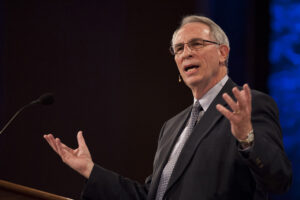
JACKSON, Tenn. (BP)–The politicization of prayer continues to abound.
Communities in Virginia are debating a federal court ruling that outlawed prayer to begin town council meetings. In Canada, a court decision is forcing the military to change its policies on how soldiers must act during a prayer. In Boston, parishioners from a church closed down by the Archdiocese of Boston are using prayer as a form of protest.
And a cover story in the Dec. 20 edition of U.S. News and World Report explores the topic of prayer and what people pray for.
But regardless of the status of prayer in society -– regardless of whether the government restricts public expressions of prayer or not — for Christians prayer will always be a spiritual discipline of vital importance, according to Union University professor George Guthrie.
“At its heart, Christianity is relational,” said Guthrie, the Perry Professor of Bible and chair of Union’s Christian studies department. “It is a relational religion. This is not just about what we do for God. It’s not about us simply conforming to a set of rules. It’s that God has invited us into a profound relationship with Himself. The barriers have been torn down. He is still awesome, and He’s God and we’re not, but we have been invited into His presence.”
Prayer then is the vehicle through which that relationship is nurtured and strengthened. Prayer is a communication tool that allows Christians to grow in their relationship to God.
“If I do not relate to my wife, if I do not communicate with her in an ongoing way, then our relationship’s going to stagnate,” Guthrie said. “It’s the same way with our relationship with God. We need the ability to talk to Him about things.”
But for many Christians, prayer isn’t the easiest of tasks, said Todd Brady, Union’s campus minister
“It’s easy to be spiritual these days, but the kind of prayer that we are called to from the Scriptures, no I don’t think it’s easy,” Brady said. “Even the disciples had major difficulties in prayer. We see that in the Gospels. The kind of prayer that is Christian prayer requires focus, patience and diligence, and that’s what makes it hard.”
Only through an appreciation for the Word of God and knowledge of the purpose and nature of prayer can a Christian pray obediently, Brady said. That involves studying the examples of prayer in the Scriptures to understand God’s standard.
“There’s a standard to which we must aspire,” Brady said. “Simply praying is not enough. We must pray rightly. I don’t think that it is possible to be faithful in prayer apart from a knowledge of the Word.”
John Franklin, a pastoral ministries specialist for LifeWay Christian Resources, listed several keys to a strong prayer life.
“Number one, prayer begins with an absolute expectation that God wants to use you and is doing something around your life, and He can do anything,” Franklin said. “Your expectation is that something’s going to happen.”
Christians also must truly desire that for which they are praying, and they must be God-centered in their prayer. Franklin said the apostles provide an illustration of this.
And, Franklin said, “When you look at the Gospels, [the disciples’] spiritual power is very anemic. When you look at the Book of Acts, they are radically changed. The primary difference was they went from trying to do things on their own agenda, from their own perspective, to doing things for God’s sake and God’s interests.”
In praying properly, Union President David Dockery said Christians would do well to follow the model prayer of Jesus.
“Our first responsibility is to recognize the greatness and goodness of God,” Dockery said. “We acknowledge His majesty and mercy by saying, ‘Hallowed is Your name, how great is Your Kingdom.’ The model that Jesus gave us helps us understand that first of all, prayer is more about God than it is about us.”
Secondly, another dimension to prayer includes thanksgiving for God’s blessings and the opportunity to make daily requests. Other examples in Scripture include believers making specific requests to God in times of illness, danger and anxiety.
“We recognize our dependence upon God for every provision of life,” Dockery said.
Guthrie added that proper prayer includes praying for God to advance His Kingdom in the world, for forgiveness, for authorities and government, for church leaders and for other people -– namely, for all relevant parts of life.
“That presupposes that this world isn’t divided into two spheres –- the religious sphere and the real world,” Guthrie said. “That two-sphere view of life is not the biblical view. The biblical view is there’s only one sphere. It’s all God’s sphere, and therefore God can intervene and invade in all aspects of it.”
Dockery acknowledged that the concept of prayer can be complex, especially when addressing questions about whether God changes His mind because of the prayers of His people.
“Somehow in the great mystery and providence of God, He has willed that His purposes are accomplished through various means,” Dockery said. “One of those means is prayer. Thus, prayer does not change God, but it is what is used to advance God’s purposes in our lives. God is immutable, faithful, constant, changeless, but He does seemingly respond to His people in Scripture when they come to Him in humble recognition of His divine sovereignty.”
–30–















